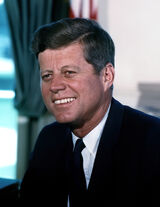The 1960 United States presidential election was the 44th quadrennial presidential election. It was held on Tuesday, November 8, 1960. It pitched the Republican ticket of incumbent Vice President Richard Nixon and Massachusetts Senator Henry Cabot Lodge Jr. against Massachusetts Senator John F. Kennedy and Senate majority leader Lyndon B. Johnson of Texas.
Nixon faced little opposition in the Republican race to succeed popular incumbent Dwight D. Eisenhower. Kennedy, a U.S. Senator from Massachusetts, established himself as the Democratic front-runner with his strong performance in the 1960 Democratic primaries, including a key victory in West Virginia over United States Senator Hubert Humphrey. He defeated Senate Majority Leader Lyndon B. Johnson on the first presidential ballot of the 1960 Democratic National Convention, and asked Johnson to serve as his running mate. The issue of the Cold War dominated the election, as tensions were high between the United States and the Soviet Union.
Many Southern Democrats were opposed to voting rights for African Americans living in the South. There was a call from segregationists for electoral votes to be withheld or to be cast to Harry F. Byrd, an independent candidate. Both before and after the convention, they attempted to put unpledged Democratic electors on their states' ballots in the hopes of influencing the race: the existence of such electors might influence which candidate would be chosen by the national convention, and, in a close race, such electors might be in a position to extract concessions from either the Democratic or Republican presidential candidates in return for their electoral votes.
Nixon won a 262 electoral votes and 29 states, Kennedy won 260 electoral votes and 19 states, and fourteen unpledged electors from Mississippi and Alabama cast their vote for Senator Harry F. Byrd, as did a faithless elector from Oklahoma. Neither candidate won a majority in the Electoral College, forcing a contingent election in the House of Representatives to elect the president, and in the Senate to elect the vice president.
Most southern Democratic representatives voted for Byrd, and the senators voted for Thurmond, preventing a majority in either chamber. If both houses were unable to elect a candidate, Democratic House Speaker John McCormack would have been inaugurated as president, pressuring the Republicans to drop their civil rights plank in an attempt to win the appeal of the southern Democrats. The Democratic Party did the same shortly afterwards, but most of the southern Democrats voted for Nixon, winning him the election.
It is believed the segregationist Democrats made their own party lose in an attempt to pressure it into supporting segregation. However, the southern Democrat senators did not vote for Nixon's running mate Henry Cabot Lodge Jr, so McCormack was inaugurated as vice president, since no candidate won a majority.


